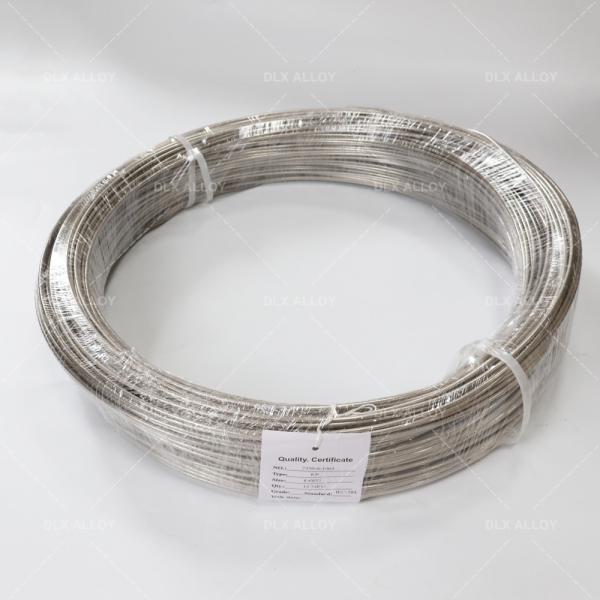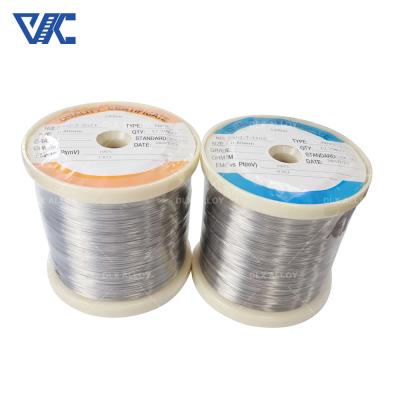Introduction:
Type N thermocouple bare wire is a type of thermocouple commonly used for temperature measurement and control. It is composed of nickel-chromium-silicon alloy (Nicrosil) and nickel-silicon-nickel-aluminum alloy (Nisil). Type N thermocouple bare wire is suitable for higher temperature ranges, typically measuring temperatures from -200°C to 1,300°C. This type of thermocouple has good linear characteristics and oxidation resistance, and can provide accurate and reliable temperature measurements. N-type thermocouple bare wire has wide application prospects in high-temperature industrial fields, such as metallurgy, glass manufacturing, chemical reactor monitoring in the chemical industry, and temperature measurement of high-temperature experimental devices in scientific research and laboratories. Its advantages include high-temperature measurement capabilities, corrosion resistance and fast response.
Nickel-chromium-silicon-nickel-silicon-magnesium thermocouple (N-type thermocouple) is a low-cost metal thermocouple. It is the latest internationally standardized thermocouple.
The nominal chemical composition of the positive electrode (NP) is: Ni:Cr:Si ≈ 84.4:14.2:1.4,
The nominal chemical composition of the negative electrode (NN) is: Ni:Si:Mg ≈ 95.5:4.4:0.1,
Its operating temperature range is - 200~1300°C.
Characteristic:
- Thermocouple material: N-type thermocouple bare wire is composed of nickel-chromium-silicon alloy (Nicrosil) and nickel-silicon-nickel-aluminum alloy (Nisil). Nicrosil is the positive electrode of the N-type thermocouple, and Nisil is the negative electrode.
- Temperature range: Type N thermocouple bare wire is suitable for higher temperature ranges, typically measuring temperatures from -200°C to 1,300°C (-328°F to 2,372°F).
- Linear characteristics: N-type thermocouple bare wire has good linear characteristics within its operating temperature range and can provide relatively accurate temperature measurements.
- Oxidation resistance: N-type thermocouple bare wire has good oxidation resistance and can provide reliable temperature measurement in high temperature environments.
Advantage:
- High temperature measurement: Type N thermocouple bare wire is suitable for applications requiring high temperature measurement, capable of withstanding high temperature environments and providing accurate temperature measurements.
- Corrosion resistance: N-type thermocouple bare wire has good corrosion resistance to some corrosive gases and liquids, and is suitable for temperature measurement in some chemical industries and corrosive environments.
- Fast response: N-type thermocouple bare wire has fast temperature response capability and can quickly reflect temperature changes.
Relevant specific parameters:
- Temperature range: -200°C to 1,300°C (-328°F to 2,372°F)
- Thermoemf output: Varies based on temperature changes, usually in the microvolt (μV) level.
- Linear characteristics: has good linear characteristics.
- Sensitivity: Varies based on specific model and manufacturer.
| Code | Wire Component of the thermocouple |
| +Positive leg | - Negative Leg |
| N | Ni-Cr-Si(NP) | Ni-Si-magnesium (NN) |
| K | Ni-Cr(KP) | Ni-Al(Si) (KN) |
| E | Ni-Cr(EP) | Cu-Ni (EN) |
| J | Iron (JP) | Cu-Ni (JN) |
| T | Copper (TP) | Cu-Ni (TN) |
| B | Platinum Rhodium-30% | Platinum Rhodium -6% |
| R | Platinum Rhodium-13% | Platinum |
| S | Platinum Rhodium -10% | Platinum |
| Using Occastion of Different Thermocouple |
| Thermocouple Type | Working Atmosphere | Working Temperature |
| Type K | KP | Oxidizing | -200 to +1200℃ |
| KN | Inert |
| Type N | NP | Oxidizing | -200 to +1200℃ |
| NN | Oxidizing |
| Type E | EP | Oxidizing | -200 to +900℃ |
| EN | Oxidizing |
| Type J | JP | Oxidizing(use in high temp) | -40 to +750℃ |
| JN | Reducing, Inert, Vacuum |
| Type T | TP | Oxidizing,Vacuum | -200 to +350℃ |
| TN | Reducing, Vacuum |
| ASTM | ANSI | IEC | DIN | BS | NF | JIS | GOST |
| (American Society for Testing and Materials) E 230 | (American National Standard Institute) MC 96.1 | (European Standard by the International Electrotechnical Commission 584)-1/2/3 | (Deutsche Industrie Normen) EN 60584 -1/2 | (British Standards) 4937.1041, EN 60584 - 1/2 | (Norme Française) EN 60584 -1/2 - NFC 42323 - NFC 42324 | (Japanese Industrial Standards) C 1602 - C 1610 | (Unification of the Russian Specifications) 3044 |
Working Temperature Range
| Diameter/mm | Long time Working temperature /ºC | Short period Working temperature /ºC |
| 0.3 | 700 | 800 |
| 0.5 | 800 | 900 |
| 0.8,1.0 | 900 | 1000 |
| 1.2,1.6 | 1000 | 1100 |
| 2.0,2.5 | 1100 | 1200 |
| 3.2 | 1200 | 1300 |
contact us
email:victory@dlx-alloy.com
Oem service:
Welcome customized size
We are experience factory for OEM&ODM service
Specific application areas:
- High-temperature industry: N-type thermocouple bare wire is suitable for high-temperature industrial fields, such as metallurgy, glass manufacturing, ceramic furnaces and high-temperature baking equipment.
- Chemical industry: Because N-type thermocouple bare wire has good corrosion resistance to corrosive gases and liquids, it is often used in the chemical industry, such as chemical reactors, temperature monitoring of corrosive media, etc.
- Research and laboratories: N-type thermocouple bare wire is widely used in scientific research and laboratories to measure the temperature of high-temperature experimental devices, test equipment and samples.
Q&A:
What is the temperature range of N-type thermocouple bare wire?
A: Type N thermocouple bare wire typically has a temperature range between -200°C and 1,300°C.
What are the advantages of N-type thermocouple bare wire?
Answer: N-type thermocouple bare wire has the advantages of high temperature measurement capability, corrosion resistance and fast response.
What applications are N-type thermocouple bare wire suitable for?
Answer: N-type thermocouple bare wire is suitable for high-temperature industrial fields, such as metallurgy, glass manufacturing, chemical reactor monitoring in the chemical industry, and temperature measurement of high-temperature experimental devices in scientific research and laboratories.
















